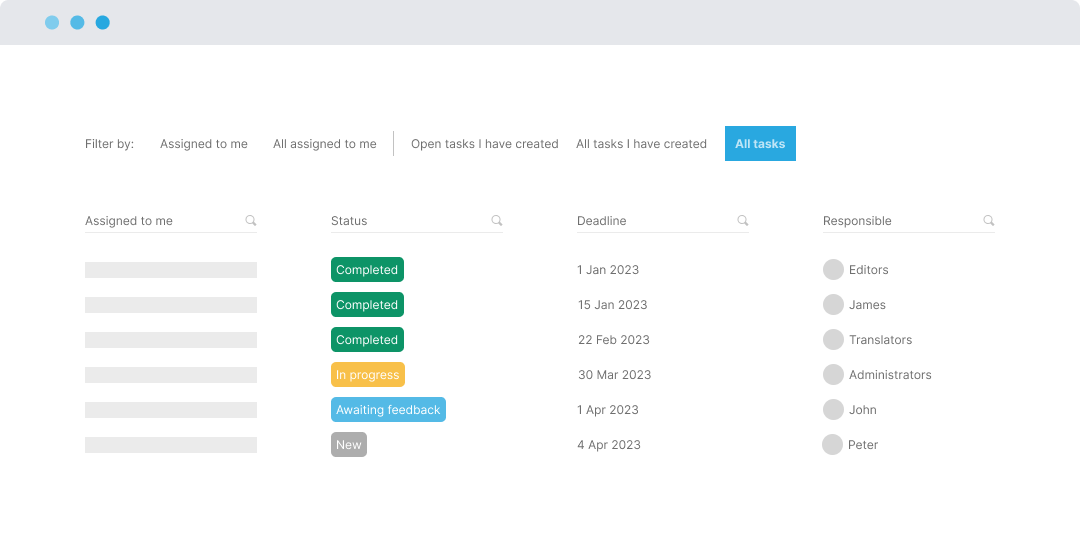This is one of the new features that we know most of our users will immediately put to good use.
Before this feature, if you wanted to manage your products in a more collaboration-friendly approach with tasks, due dates, deadlines and user assignments, there were two possible options:
1) Building task management into the actual product data models
This definitely was (and still could be!) a viable approach with Struct PIM.
It’s relatively ‘easy’ to accomplish, as Struct PIM comes with a built-in state of the art no-code data model engine that allows you to set up attributes and fields that would make up a custom built task management feature, which you could then design processes and workflows around.
But since this approach requires a deeper level of consideration of the needed setup, it is a bit cumbersome for most basic Struct PIM users to implement without the assistance of a Struct PIM partner.
2) Integrating Struct PIM with external project management tools
Another way we’ve seen users implement task management into their product enrichment processes is by incorporating an outside tool to manage the tasks, deadlines and assignments associated.
Either through manual processes or even custom integrations through the available API’s.
We’ve had users integrate Struct PIM with project management tools like Trello, only for the ability to assign tasks and due dates to the enrichment processes around Struct PIM data.
Either way, these alternative methods of adding task assignments to Struct PIM are now completely obsolete with the release of version 3.11. Read along to see why.
Introducing: the new built-in Task assignments feature
With this new feature we’ve added a link in the left sidebar navigation called Tasks.
Clicking this will open up the Tasks dashboard, which is where you can create tasks and view them all in a filterable list.
As of this written point in time, you can filter the list of tasks with the following filters:
Assigned to me
Displays the open tasks assigned to the current user.
All assigned to me
Displays all tasks assigned to the current user.
Open tasks I have created
Displays open tasks that the current user has created.
All tasks I have created
Displays all tasks that the current user has created.
All tasks
Displays all tasks across assigned users and statuses.
You can easily create a task using the Create task button in the top right side of the Tasks dashboard.
This opens up a Create new task sidebar where you can give the task a title and description as well as assign users to the task and set a task deadline.
What’s interesting is that you can also attach one or multiple entities to the task, creating a relation between the entities and the task.
An entity can be any product related data from Struct PIM:
Categories
Products
Variant groups
Variants
This creates perfect context for the task at hand for all users involved.
All attached task entities are displayed in a nice list that also acts as a checklist that can be ticked off to mark each attached entity as handled.
As seen in the video above.
Pin task to sidebar
Pinning a task to the sidebar does exactly what the description suggests. It sticks the task to the bottom of the left sidebar as seen in the video below.
This is very handy when you’re working on tasks one at a time.
By pinning a task, it sticks to the bottom of the left sidebar no matter where in Struct PIM you browse to.
Giving you quick access to the task entities you’re currently working on.
From here you can also mark each entity handled as you complete the task. As well as change the task status.
Display tasks in your shared or personal dashboards
There is a new dashboard widget to accompany this new feature that allows users to display open tasks in your personal or shared dashboards.
The new widget is called Task list and it allows you to add a list of one of the following groups of tasks:
Open tasks assigned to me
This is typically relevant for regular Struct PIM users that want to see all tasks that are assigned to them.
Open tasks created by me
This is typically relevant for Struct PIM managers or team leaders that want to be able to see all tasks they’ve assigned to others.
Once added, the widget behaves like any other dashboard widget in Struct PIM, allowing you to reorder or resize the widget as you want it to display in your dashboard.
Conclusion
The new Task assignments feature extends the possibilities with Struct PIM greatly, as it now adds powerful task management abilities right inside your Struct PIM account.
Allowing you to easily add new tasks, assign tasks to users, set deadlines, attach entities and last but not least display tasks inside your personal or shared dashboards.
This equips Struct PIM users with the ultimate collaboration-friendly approach to managing progress around product enrichments.
All without going through the trouble of integrating with external project management and to-do apps just for the ability to set deadlines. Now you can do it all inside of Struct PIM.
This was a quick overview of this new powerful feature that came with the release of Struct PIM 3.11.
Please reach out if you have questions related to this feature or anything else in relation to Struct PIM.

